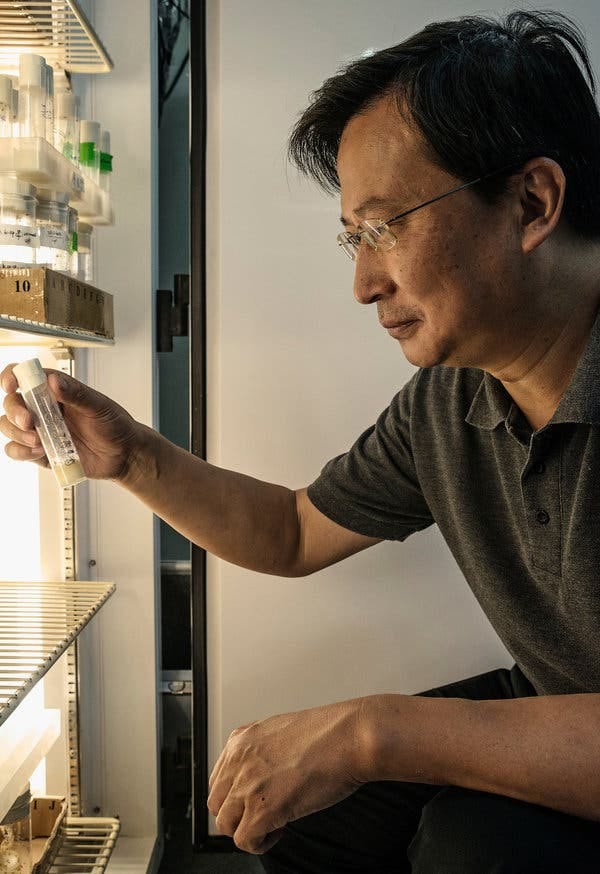Leading scientist calls on China to share gene data
Renowned, outspoken Professor Rao Yi praises UK Biobank and criticizes unnecessary Chinese restrictions.
Professor 饶毅 Rao Yi, President of Capital Medical University in Beijing, is a renowned biologist who gave up US citizenship and returned to China (Financial Times in 2014).
In 2007 he made a decision that shocked his peers, giving up his position as head of a scientific institute at Northwestern University in Illinois to take up a post as dean of the School of Life Sciences at Peking University. Rao resigned as dean last [2013] September in an effort to set an example to other Chinese people who he believes “try to hold on to ‘official’ positions for too long.
Prof. Rao has also been outspoken about the problems he saw in China’s science community. He and Prof. 施一公 Shi Yigong, another famed returnee and now President of the West Lake University in Hangzhou, criticized China’s research culture as “wastes resources, corrupts the spirit, and stymies innovation” in a famous 2010 editorial in the Science journal.
On Saturday, November 19, Prof. Rao published 公开和共享中国人基因序列的好处 The Benefits of Publishing and Sharing Chinese People’s Gene Sequences on his WeChat blog. He also shared it on his blog hosted by Caixin.
(Credit: Rao Yi in his laboratory at Peking University, looking at samples of genetically modified fruit flies. Gilles Sabrie for The New York Times)
Below is a full translation
The Benefits of Publishing and Sharing Chinese People’s Gene Sequences
My laboratory has been able to access the Whole Genome Sequencing (WGS) data of 500,000 participants of the UK Biobank, where analyses have revealed the relationship between some diseases (and common traits) with gene mutations. Our further research is tantamount to studying the relationship between gene mutation and disease among Britons. That is because it's difficult to access sufficient Chinese WGS data.
The restriction on the publication and sharing of China's WGS data is actually the result of two forces 20 years ago. One is that some people did not understand (science) and thought it was possible to manufacture [Pekingnology: biological] weapons against the WGS data of a certain country. The other is some incapable and selfish domestic researchers.
By incapable and selfish researchers, I mean a small group of researchers at that time (it was a handful of people because, at that time, few people paid attention). They were incapable of analyzing the WGS in China and wanted to take foreigners for a ride, so they aimed to force foreigners into cooperating with them via such a policy.
If WGS data enable [Pekingnology: biological] weapon manufacturing, why would the UK so easily let us join the use of British WGS data of 500,000 people? Obviously, the myth [Pekingnology: biological weapon manufacturing] is a result of the misunderstanding of the ignorant and the fabrication of the liars.
The disclosure and contribution of genetic information can accelerate research into human disease and health.
Our country's restriction of genetic information brings many unnecessary obstacles on many fronts.
Various diseases, if genetically related, differ regionally and demographically, especially in their incidence. At present, for example, more than 95% of the whole genome scans published worldwide are from the West. If most scientific researchers in the world can only use the genetic information of Westerners, then we are all studying disease-related gene mutations common in the West, and we are helping to solve the common issues among common diseases in the West.
We have studied a gene whose mutation was found to cause diabetes in multiple gene banks in the UK and the West. And this gene was rarely studied before. We created animals with this gene mutation, and our initial results show that it can be confirmed as an important factor for diabetes and obesity.
We want to know about the gene and its mutations in the Chinese population. But there is a great lack of open data, and what is available upon our outreach is uncertain in terms of sharing and data quality.
If we continue to restrict the disclosure and sharing of genetic data of the Chinese population, then many people in our country can only rely on Western data to study disease-related gene mutations among Westerners. That will surely serve Western patients, but whether it will serve the people of China is uncertain. If there is Chinese data available, Chinese researchers are likely to choose [Pekingnology: disease-related gene mutations with] higher incidence in China.
Responsible people with integrity need to change this situation as soon as possible.
This [Pekingnology: current] policy is of no benefit to the Chinese people. (Enditem)
Pekingnology in August translated a WeChat blog post by Prof. Rao, where he observed that Chinese applicants to domestic graduate programs in life sciences - and beyond - have risen in both quantity and quality due to the decreasing hospitality in the United States.
Relatedly, a recent guest essay in The New York Times by Diana Fu, an associate professor at the University of Toronto and a nonresident fellow at the Brookings Institution, argued America Should Open Its Arms to Chinese Students
It should ease visa restrictions for Chinese students, reinstate exchange scholarship programs and actively court Chinese students to study in the United States.



